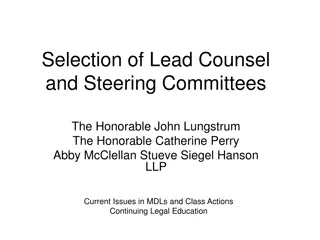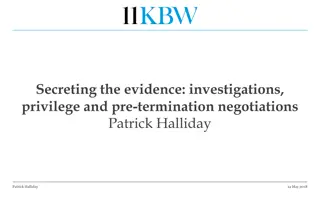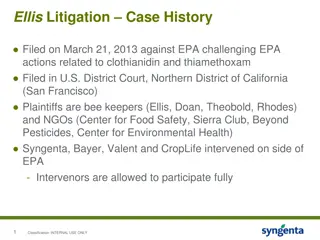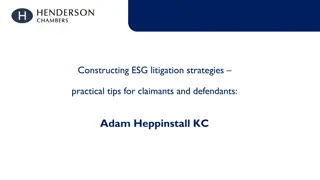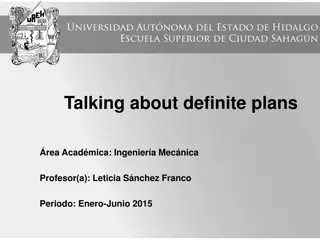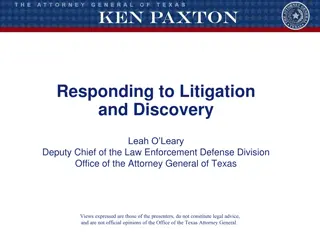Franco-Gonzalez Litigation and Advocacy Timeline
The Franco-Gonzalez litigation timeline outlines efforts to provide legal representation and protections for individuals with serious mental disorders in detention or removal proceedings within the U.S. The case involves creating competency determination systems, advocating under the Rehabilitation Act, obtaining injunctions for legal representation, class certifications for detainees, summary judgments, and permanent injunctions requiring free legal representation and bond hearings. Implementation plans for screening detainees and rigorous competency procedures have been ordered as part of the ongoing advocacy efforts.
Download Presentation

Please find below an Image/Link to download the presentation.
The content on the website is provided AS IS for your information and personal use only. It may not be sold, licensed, or shared on other websites without obtaining consent from the author.If you encounter any issues during the download, it is possible that the publisher has removed the file from their server.
You are allowed to download the files provided on this website for personal or commercial use, subject to the condition that they are used lawfully. All files are the property of their respective owners.
The content on the website is provided AS IS for your information and personal use only. It may not be sold, licensed, or shared on other websites without obtaining consent from the author.
E N D
Presentation Transcript
Anatomy of the Franco Litigation & Advocating for Franco Protections in Nationwide Policy States
Franco-Gonzalez v. Holder Timeline 2010: Class Action Complaint EOIR & ICE must: (a) create competency determination system to assess whether pro se detainees have serious mental disabilities and (b) provide legal representation to those who are not competent to represent themselves Claims Section 504 of the Rehabilitation Act INA (8 U.S.C. 1229a(b)(4)(B)) Due Process Clause Late 2010-2011: Preliminary Injunctions Government must provide certain Named Plaintiffs with legal representation under the Rehabilitation Act.
Franco-Gonzalez v. Holder Timeline November 2011: Class Certification Main Class Detainees in Arizona, California, and Washington who have a serious mental disorder or defect that may render them incompetent to represent themselves in detention or removal proceedings, and who presently lack counsel in their detention or removal proceedings. Sub-Class One have a serious mental disorder or defect that renders them incompetent to represent themselves in immigration proceedings Sub-Class Two who have been detained for more than six months
Franco-Gonzalez v. Holder Timeline April 2013: Summary Judgment & Permanent Injunction Sub-Class One Rehabilitation Act requires the Government to provide free legal representation. Sub-Class Two INA requires bond hearings for Franco class members who have been detained longer than 180 days. Franco injunction still in effect despite Jennings v. Rodriguez, 138 S. Ct. 830 (2018). October 2014: Implementation Plan Order Comprehensive process for screening detainees & rigorous procedures for determining the competency to represent themselves. Franco-Gonzalez v. Holder, No. CV 10 02211 DMG (DTBx), 2014 WL 5475097 (C.D. Cal. Oct. 29, 2014).
ICE Screening Procedures Franco Class Criteria Mental disorder that is causing serious limitations in communication, memory or general mental and intellectual functioning or a severe medical condition that significantly impairs mental function; or Active psychiatric symptoms or behavior: severe disorganization, active hallucinations or delusions, mania, catatonia, severe depressive symptoms, suicidal ideation and/or behavior, marked anxiety or impulsivity; or Demonstrates significant symptoms of one of the following: Psychosis or Psychotic Disorder; Bipolar Disorder; Schizophrenia or Schizoaffective Disorder; Major Depressive Disorder with Psychotic Features; Dementia and/or Neurocognitive Disorder; and Intellectual Development Disorder (moderate, severe or profound)
ICE Screening Procedures Immigration Judge (IJ) Mental Health Assessment If an individual meets the Franco criteria, their file is sent to OCC within 7 days OCC sends notice of class membership to the IJ or BIA within 21 days Immediate screening of serious mental disorder or condition occurs within 72 hours of detention Further screening occurs within 14 days of detention An individual exhibiting evidence of serious mental disorder or condition receives mental health assessment within 14 days IJ holds a Judicial Competence Inquiry hearing within 21 days after receiving notice from OCC ICE Office of Chief Counsel (OCC) Initial Screenings
IJ Competency Determination Procedures If ICE fails to screen, still Franco class member if IJ finds that there is a bona fide doubt about the individual s competency to represent themselves. Pro Se Competency Standard Meaningfully participate in the proceeding as set forth in Matter of M A M the nature and object of the proceeding ; the privilege of representation by counsel ; the right to present, examine, and object to evidence ; the right to cross-examine witnesses ; and the right to appeal Individual s ability to perform additional functions necessary for self- representation exercise the rights listed above ; make informed decisions about whether to waive the rights listed above ; respond to the allegations and charges in the proceeding ; present information and evidence relevant to eligibility for relief ; and act upon instructions and information presented by the Immigration Judge and government counsel
IJ Competency Determination Procedures Judicial Competency Inquiry No presumption of competence or incompetence IJ determination Individual will not be provided a free legal representative Competent Individual will be provided a free legal representative within 60 days Not Competent Individual will not be provided a free legal representative Competent IJ orders Forensic Competency Evaluation to occur within 45 days IJ holds Competency Review within 30 days of receiving evaluation More information is needed Individual will be provided a free legal representative within 21 days Not Competent
Franco Implementation Plan Order Third-Party Notification ICE must accept relevant information and documents from family members, social workers, or treatment providers regarding detainees mental disorders or conditions, and provide such information and documents to the qualified mental health provider performing the mental health assessment. [T]hird parties (including family members, social service providers, and others) may submit to the Immigration Judge, and the Immigration Judge shall consider, additional mental health information or other information relevant to a detainee s mental competency or incompetency to represent him-or herself in immigration proceedings. Transfers Any Class member who is subsequently transferred outside of Arizona, California or Washington, continues to be entitled to all of the benefits of Class membership during the course of their immigration proceedings. Board of Immigration Appeals [T]he Board shall order a remand to the Immigration Judge with instructions to apply the procedures set forth in Section III.B of this Order. Corona Chavez v. Barr, 786 F. App'x 123 (9th Cir. 2019).
Franco Orders During Monitoring Period ICE Screening Forms A uniform screening process across all Covered Facilities is the most efficient and effective way to consistently identify Class Members. IJ Training On-Boarding Training for All New IJs Before new IJs preside over any detained matters, Defendant EOIR shall require them to receive on-board IJ training regarding Franco, including the pro se competency standard and how to apply the bona fide doubt standard for Class Membership, and to refer any Judicial Competency Inquiries and Competency Review Hearings to other IJs who have received the full multi-hour Franco training. Multi-Hour Franco Training for IJs in Arizona, California, and Washington The Court strongly recommends that Defendants [o]pen Franco-specific training to existing IJs who may wish to attend such training. Written Materials EOIR is certain that the IJs are capable of reading and applying the content in the new training materials on their own and that IJs will continue to reach out to agency counsel as they currently do with any questions.
Enforcement of Franco Orders District Court Implementation Plan Order: Plaintiffs may file a motion for enforcement in the United States District Court for the Central District of California. [T]hreaten a material breach of the Implementation Plan and merit the Court s attention and consideration. BIA/9thCircuit Matter of M-J-K-, 26 I. & N. Dec. 773, 774 n.2 (BIA 2016) (remanding to the IJ to ensure compliance with the applicable standards required by Franco- Gonzalez v. Holder ) Calderon-Rodriguez v. Sessions, 878 F.3d 1179, 1184 n.2 (9th Cir. 2018) ( DHS may have violated an order implementing the permanent injunction in Franco-Gonzalez by failing to provide Calderon s updated mental health information to the IJ and BIA[.] ) Corona Chavez v. Barr, 786 F. App'x 123 (9th Cir. 2019)
Expansion of Franco To Other Contexts Petitions for Review (Perez v. Barr, 957 F.3d 958 (9th Cir. 2020)) We assume that there may be cases in which a mentally incompetent petitioner requires the assistance of counsel to seek meaningful review of a removal order and that appointment of counsel may be necessary in such cases. The question before us is thus more limited: whether the Suspension Clause requires government compensation of court-appointed counsel. We hold that it does not, at least as long as we can obtain the assistance of competent pro bono counsel. [W]e do not address whether due process may require the appointment of government-compensated counsel for mentally incompetent aliens in petitions for review. Not-Detained (Mazan v. Barr, 808 F. App x 477 (9th Cir. 2020)) Matter of M A M : [S]ubstantial evidence supports the IJ s conclusion that Mazan was competent. Rehabilitation Act: We decline to review whether Mazan was entitled to counsel under the Rehabilitation Act. This issue is raised only by an amicus curiae, and was not adopted by Mazan in her briefing.
Protections in Nationwide Policy States Enforce ICE & EOIR Publicly Available Policies ICE Policies 11063.1 (Apr. 22, 2013) & 11067.1 (May 7, 2014) Adopt Franco Class Criteria EOIR Phase I Guidance (2013) Pro Se Competency Standard slightly different Presumption of competency Referral to Forensic Competency Evaluation not required Process for Conducting a Judicial Inquiry FOIA to Obtain Updated Policies, Guidance, and Training Materials Third-Party Notifications Collaborate with Protection and Advocacy agency 42 U.S.C. 15043; 42 C.F.R. 51.42 Post Nationwide Policy notices in jails?
Protections in Nationwide Policy States Threaten Litigation Administrative Procedure Act An agency s failure to comply with its own procedures is arbitrary, capricious conduct which violates the APA. 5 U.S.C. 706(a)(2); United States ex. rel. Accardi v. Shaughnessy, 347 U.S. 260, 267 (1954); Morton v. Ruiz, 415 U.S. 199, 235 (1974) (applying Accardi to internal IRS manual). Franco-style Lawsuit Rehabilitation Act, INA, Due Process Clause Jurisdictional Challenge in Federal District Court 8 U.S.C. 1252(b)(9) Judicial review of all questions of law and fact, including interpretation and application of constitutional and statutory provisions, arising from any action taken or proceeding brought to remove an alien from the United States shall be available only in judicial review of a final order under this section JEFM v. Lynch, 837 F. 3d 1026 (9th Cir. 2016) Jennings v. Rodriguez, 138 S. Ct. 830 (2018)

 undefined
undefined












